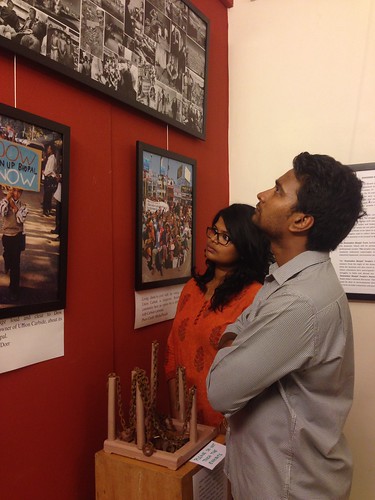By TCN News,
Chennai: Even as five Bhopal gas victims began a waterless hunger strike in Delhi on Monday, the Bhopal campaign’s Chennai supporters have asked the Government of India to prioritise Swachh Bhopal (Clean Bhopal) as part of Swachh Bharat (Clean India) campaign by forcing Dow Chemical to clean up the toxic contaminated site at Bhopal.
It is unfortunate that survivors of the worst industrial disaster are waiting for compensation, medical rehabilitation and justice even 30 years after the event, the Chennai Supporters declared at a press conference here.

Prof Vasanthi Devi, former vice-chancellor Manonmaniam Sundaranar University, writer and social commentator Gnani and Nityanand Jayaraman of the International Campaign for Justice in Bhopal addressed the press conference that launched a week-long exhibit on Bhopal.
The exhibit commemorates 30 years of struggle for justice in Bhopal and showcases two objects of deep personal memory from the night of the disaster and from the protest movement. The exhibits have been donated to the ‘Remember Bhopal Trust’, which is setting up a People’s Museum in Bhopal to showcase how contemporary India’s most traumatic industrial catastrophe has raised extraordinary questions about justice, industrial expansion, environment and international corporate crime, a release said.
First is a child’s jumper donated by Bismillah Bee. “Bismillah Bee fled in panic, clutching her three-year-old son Sajid Ali tightly to her chest, trying to escape the plume of poisonous gas that fateful night. She does not remember how long she ran, or in which direction. “Had he been alive, he would be married today, with children of his own,” she said, handing Sajjad’s peach-coloured sweater to the ‘Remember Bhopal’ museum volunteers, it said.
Another was the chain and locks used by the Children Against Dow Carbide, a group comprising third-generation adolescent children of gas-affected people, who had staged their first dramatic protest in 2008 by chaining themselves to the residence of Prime Minister Manmohan Singh. They too have demanded a speedy clean-up of toxic wastes and clean water for the neighbourhoods that were forced to consume contaminated water. These are now artefacts in the museum.
The exhibits were hosted by Studio Palazzo, an art gallery, and Silk Route, a boutique in Harrington Road, Chetpet.

